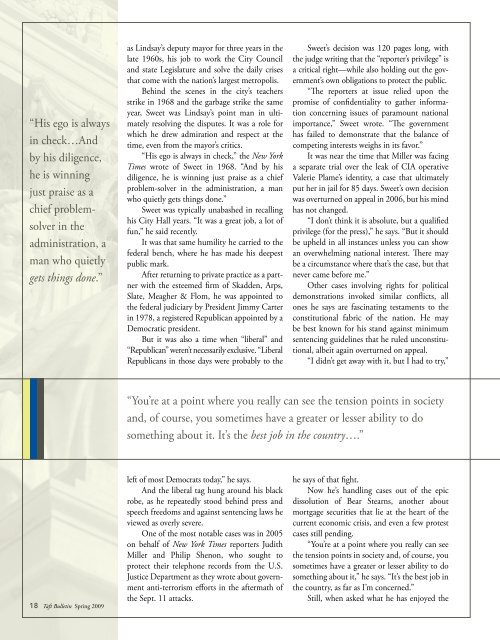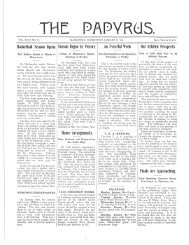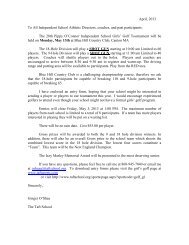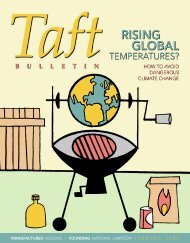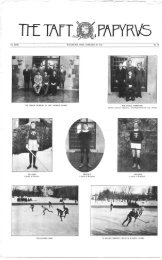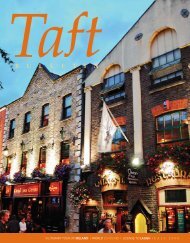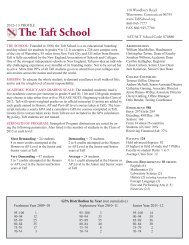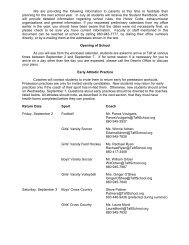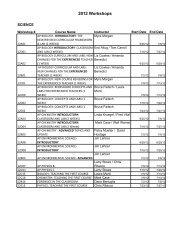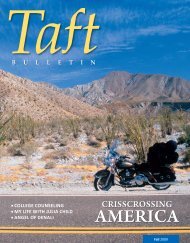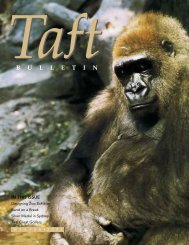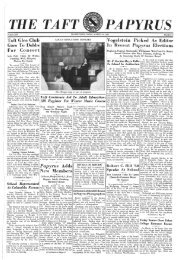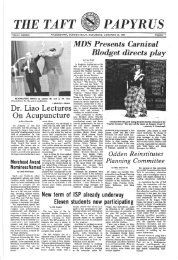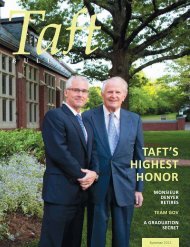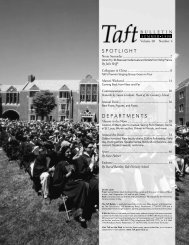Create successful ePaper yourself
Turn your PDF publications into a flip-book with our unique Google optimized e-Paper software.
“His ego is always<br />
in check…And<br />
by his diligence,<br />
he is winning<br />
just praise as a<br />
chief problemsolver<br />
in the<br />
administration, a<br />
man who quietly<br />
gets things done.”<br />
18 <strong>Taft</strong> Bulletin Spring 2009<br />
as Lindsay’s deputy mayor for three years in the<br />
late 1960s, his job to work the City Council<br />
and state Legislature and solve the daily crises<br />
that come with the nation’s largest metropolis.<br />
Behind the scenes in the city’s teachers<br />
strike in 1968 and the garbage strike the same<br />
year, Sweet was Lindsay’s point man in ultimately<br />
resolving the disputes. It was a role for<br />
which he drew admiration and respect at the<br />
time, even from the mayor’s critics.<br />
“His ego is always in check,” the New York<br />
Times wrote of Sweet in 1968. “And by his<br />
diligence, he is winning just praise as a chief<br />
problem-solver in the administration, a man<br />
who quietly gets things done.”<br />
Sweet was typically unabashed in recalling<br />
his City Hall years. “It was a great job, a lot of<br />
fun,” he said recently.<br />
It was that same humility he carried to the<br />
federal bench, where he has made his deepest<br />
public mark.<br />
After returning to private practice as a partner<br />
with the esteemed firm of Skadden, Arps,<br />
Slate, Meagher & Flom, he was appointed to<br />
the federal judiciary by President Jimmy Carter<br />
in 1978, a registered Republican appointed by a<br />
Democratic president.<br />
But it was also a time when “liberal” and<br />
“Republican” weren’t necessarily exclusive. “Liberal<br />
Republicans in those days were probably to the<br />
left of most Democrats today,” he says.<br />
And the liberal tag hung around his black<br />
robe, as he repeatedly stood behind press and<br />
speech freedoms and against sentencing laws he<br />
viewed as overly severe.<br />
One of the most notable cases was in 2005<br />
on behalf of New York Times reporters Judith<br />
Miller and Philip Shenon, who sought to<br />
protect their telephone records from the U.S.<br />
Justice Department as they wrote about government<br />
anti-terrorism efforts in the aftermath of<br />
the Sept. 11 attacks.<br />
Sweet’s decision was 120 pages long, with<br />
the judge writing that the “reporter’s privilege” is<br />
a critical right—while also holding out the government’s<br />
own obligations to protect the public.<br />
“<strong>The</strong> reporters at issue relied upon the<br />
promise of confidentiality to gather information<br />
concerning issues of paramount national<br />
importance,” Sweet wrote. “<strong>The</strong> government<br />
has failed to demonstrate that the balance of<br />
competing interests weighs in its favor.”<br />
It was near the time that Miller was facing<br />
a separate trial over the leak of CIA operative<br />
Valerie Plame’s identity, a case that ultimately<br />
put her in jail for 85 days. Sweet’s own decision<br />
was overturned on appeal in 2006, but his mind<br />
has not changed.<br />
“I don’t think it is absolute, but a qualified<br />
privilege (for the press),” he says. “But it should<br />
be upheld in all instances unless you can show<br />
an overwhelming national interest. <strong>The</strong>re may<br />
be a circumstance where that’s the case, but that<br />
never came before me.”<br />
Other cases involving rights for political<br />
demonstrations invoked similar conflicts, all<br />
ones he says are fascinating testaments to the<br />
constitutional fabric of the nation. He may<br />
be best known for his stand against minimum<br />
sentencing guidelines that he ruled unconstitutional,<br />
albeit again overturned on appeal.<br />
“I didn’t get away with it, but I had to try,”<br />
“You’re at a point where you really can see the tension points in society<br />
and, of course, you sometimes have a greater or lesser ability to do<br />
something about it. It’s the best job in the country….”<br />
he says of that fight.<br />
Now he’s handling cases out of the epic<br />
dissolution of Bear Stearns, another about<br />
mortgage securities that lie at the heart of the<br />
current economic crisis, and even a few protest<br />
cases still pending.<br />
“You’re at a point where you really can see<br />
the tension points in society and, of course, you<br />
sometimes have a greater or lesser ability to do<br />
something about it,” he says. “It’s the best job in<br />
the country, as far as I’m concerned.”<br />
Still, when asked what he has enjoyed the


